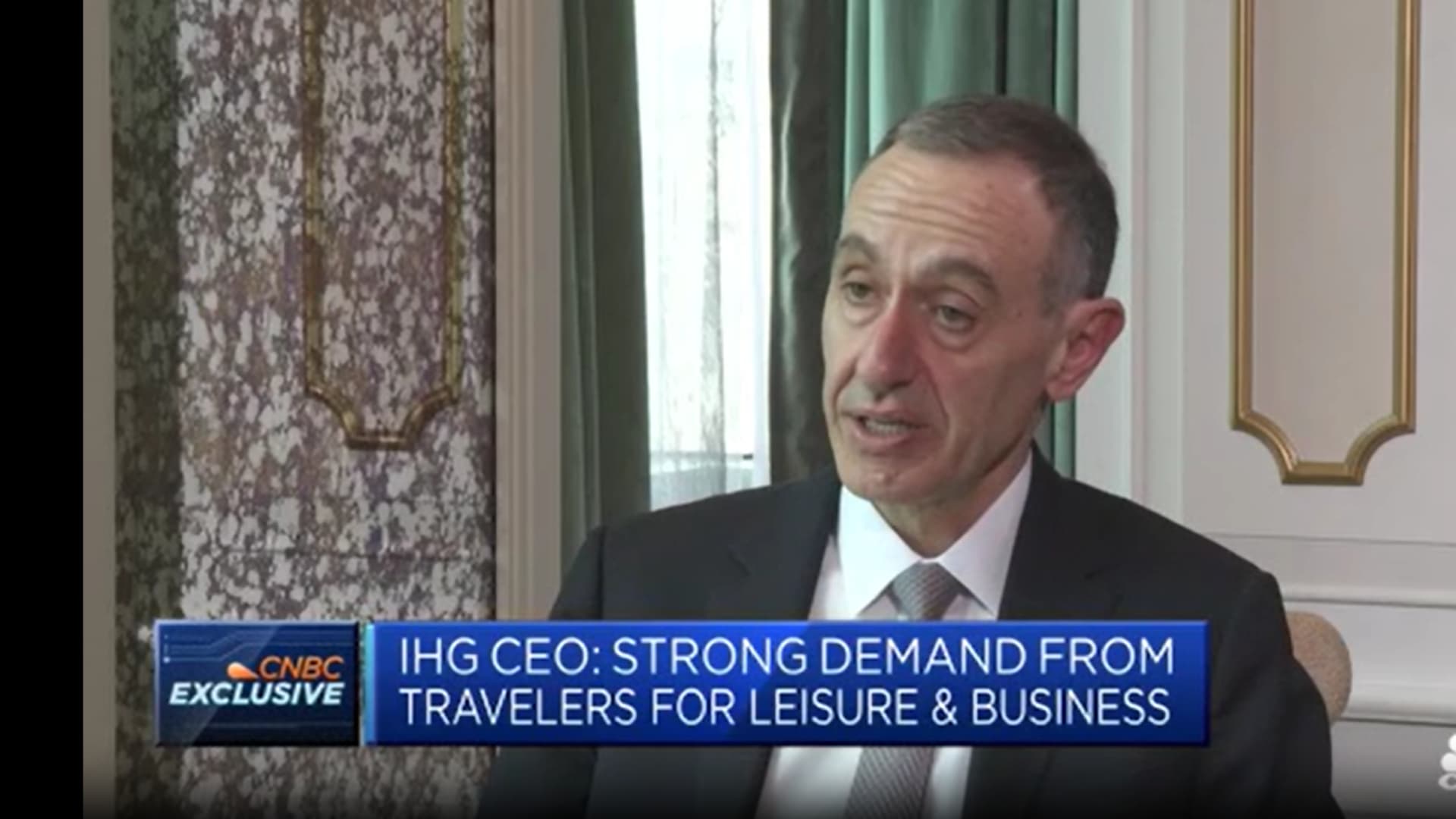Pent-up travel demand — which drove global travel recovery following the Covid-19 pandemic — is over, said Intercontinental Hotels Group CEO Elie Maalouf.
“People started traveling really by the end of 2020 as restrictions started to lift,” he said. “So we’re really past revenge travel — even in China.”
The company’s latest quarterly update showed travel demand remained strong during the close of the summer travel season.
“We think we’re in a sustainable place,” Maalouf said. “Our bookings for groups and meetings going into 2024 and beyond are the strongest we’ve seen in a very long time.”
“We’re pleased with the demand that we’re seeing from travelers … and hope it continues,” he added.
IHG’s third quarter trading update, which published Friday, showed the company’s revenue per available room — or “revpar” — was up 10.5% compared to third quarter 2022, and nearly 13% higher compared to the third quarter of 2019, which was before the pandemic.
That’s despite a 3% drop in revpar, compared to 2019, in large cities in Greater China, which are more dependent on international travelers.
Maalouf told CNBC that lack of “airlift,” or flight capacity, into China is below 50% of prepandemic levels, which is affecting travel recovery in cities like Beijing, Shanghai, Guangzhou and Shenzhen.
“But if you look at the country as a whole, travel — which is mostly domestic in China — it’s recovered well above 2019,” he said, adding that more than 80% of IHG’s business in China is in mid-sized to smaller cities.
Room rates and global growth
Occupancy levels in the third quarter at IHG hotels was 72% — just 1% shy of pre-pandemic levels, according to the quarterly update. But average room rates have jumped well above 2019 levels — up nearly 6% in Greater China, 15% in the Americas, and 24% in Europe, Middle East, and Africa (EMEA) and Asia.
But rising rates are barely keeping up with inflation, said Maalouf.
“Room rates have not really exceeded inflation in any of our markets,” he said. “I think people’s willingness to travel is exhibited by the fact they’re willing to pay.”
IHG opened 50 hotels — with some 7,700 rooms — from July to September, with a net system growth of 4.7% year-on-year — this includes the company’s strategic alliance with the Spanish-owned Iberostar Hotels & Resorts, according to the trading update.
Our regional headquarters for the Middle East is in Dubai — and it’s staying in Dubai.Elie MaaloufCEO of Intercontinental Hotels Group
The company currently operates more than 6,200 hotels worldwide and has another 1,978 in the pipeline.
“We’re seeing growth really across all of our brands, across all of our businesses and across all of our regions,” he said. But “the population of the middle class and GDP growth is shifting more east … Southeast Asia, Central Asia, China. That’s why we’re very committed to this region.”
Maalouf also addressed the launch of Garner — IHG’s newest brand which is set to be priced lower than Holiday Inn Express — the company’s largest brand with 3,131 hotels worldwide as of Sept. 30.
“In the United States, there are about 9,000 hotels that we think are interested in joining a system. Not that we’ll have 9,000 hotels joining us, but we think a strong proportion will.”
Maalouf said the first Garner hotels will likely open by year-end in the United States.
Monitoring the Middle East
The CEO disputed reports that IHG is establishing a Middle East regional headquarters in Saudi Arabia.
“Our regional headquarters for the Middle East is in Dubai — and it’s staying in Dubai,” he told CNBC.
He said the company recently opened an office in Riyadh, reflecting its plans to expand in the Kingdom. IHG operates 40 hotels in Saudi Arabia — including InterContinental, Crowne Plaza, Holiday Inn, Staybridge Suites and Voco hotels — with another 36 hotels in the development pipeline.
The Israel-Hamas war could complicate ambitious tourism goals in Saudi Arabia and the United Arab Emirates, but Maalouf said IHG hasn’t changed its long-term plans in the region.
“It’s really heartbreaking, tragic, distressing to see the loss of life that’s occurring, and we hope that there’s a very quick end of the hostilities,” he said.
“We’re monitoring the situation very closely. But we’ve also been in the region for generations, and we look forward to staying engaged.”
